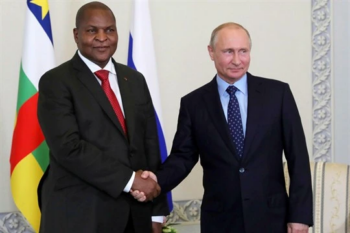Ordinarily, no one would have expected Central African Republic to be the first country in Africa to adopt bitcoin as an official currency at a time its France-linked CFA franc is worthless.
The country’s legislative arm had earlier passed a bill before sending it to President Faustin Archange Touadera for his assent which formally legalise bitcoin as its official currency.

The president’s Chief of Staff Obed Namsio described it as the “boldest and most visionary “ action following the footsteps of El Salvador which became the world’s first bitcoin adopter on September 7, 2021.
Why do we think bitcoin (BTC) adoption by the Central African Republic may fail?
We take a look at some of the decade-long problems facing the former French colony and they could hinder the success of BTC as one of the official currencies in the conflict-ravaged African country
Access to internet
In terms of connectivity to the internet, only 4% of the 5.4 million inhabitants in Central African Republic have access to the internet in 2019.
According to the World Data report on access to the internet, it means that only 216,000 in Central African Republic could access the internet three years ago. That number is low if the country is serious about the adoption of bitcoin as an official currency.
Globally, cryptocurrency completely depends on the internet. Users must have browsing phones that have the internet to make transactions and receive payments.
What this means is that over 90% of the country’s population will still depend on the fiat currency CFA franc. Then, what value would the adoption of BTC add to the lives of ordinary people in the country?
This raises several questions among financial analysts and even crypto advocates: Who exactly is the bitcoin adoption by Central African Republic made for.
Who is going to use it? Although, the adoption is met with mixed criticisms. To an economist who was quoted by BBC Africa, Yann Daworo, it’s a welcome development.
According to him, it would help businessmen who make international transactions to easily complete transactions without having to convert bundles of CFA franc to US dollars.
Some people have also longed for the country to drop the CFA franc which they described as a relic of the colonial era which gives France, its colonial master, to continue to exercise economic control over the poorest African country.
But the International Monetary Fund (IMF) was swift to react to the adoption of BTC by pointing out some of the financial risks associated with the use of bitcoin, including “financial integrity, and consumer protection” and issuing bitcoin-backed bonds.
Enabler For Funding Armed Groups
One of the fears about crypto anonymity is that it could be used to fund terrorism and promotes corruption among top officials of government.
For a country like the Central African Republic which has more than two dozen of known armed violence groups, announcing the adoption of bitcoin as one of its official currencies means some armed groups may likely tap into using cryptocurrencies to fund their violent campaign across the fragile and troubled country.
Even before bitcoin’s adoption by the country, the violent armed groups could use it to fund their deadly attacks.
Recalled that on February 6, 2019, a peace agreement was signed by 14 armed groups under the Political Agreement for Peace and Reconciliation (APPR-CAR).
The agreement, according to the World Bank report was to provide “a roadmap to long-term stability and peace”, but it failed as some of the groups pulled out of the agreement.
As of January 30, 2021, there were more than 632,000 refugees and over 1milion persons were displaced due to insecurity in the country, according to UNHCR data.
Based on high insecurity in the country, the adoption of bitcoin by Central African Republic is on the path to possible failure and even worsens the country’s fragile peace.
The country is notorious for over 40 years of a cycle of recurrent violence, killing, and gender-based violence (GBV).
Bitcoin-Backed Corruption
Since the Central Africa Republic gained independence from France on August 13, 1960, economically the country remained backwards.
Basic amenities, social services, and government institutions remain ineffective due to corruption among leaders in the country.
Instead of the country to make move to develop its self-economic programme, its political leaders run to France whenever there is turmoil in the country.
From the way the adoption of bitcoin was urgently done in the country, there is possible collusion between the lawmakers and the executive arm which could be linked to corruption.
It’s obvious that less than 5% of people who have access to the internet are majorly the elite and those in the helms of affairs.
Apart from a few African leaders who showed commitment to developing their country, most of them are known to have siphoned state resources to foreign countries.
Earlier Interest in Crypto
On the radar of countries that showed interest in cryptocurrency in a report by Crypto Head in 2021, the Central African Republic was nowhere to be found among the 210 countries captured by the Crypto-ready Index.
And there has never been any discussion around crypto-asset in the country until Wednesday, April 27, 2022, when President Touadera signed into law the Bitcoin Bill. The announcement took the world by surprise.
The landlocked country still depends on aid from the World Bank. It relies on its former colonial master to sustain itself despite its under-utilised abundant resources.
Will France Be Comfortable With Central African Republic Decision?
At the time the Central African Republic was granted independence at midnight on August 13, 1960, its French colonial masters was not willing to let the poorest country go.
This is reflected on how France has held some of its former colonies back economically decades after granting independence to most of its colonies. One of such is CFA franc.
On ascendancy of Faustin Archange Touadera to presidency on March 30, 2016, he has been tilting the country’s economic loyalty to Russia. Politically Russia and France are not allies.
Militarily, Russia’s policies do not align with France. For instance, France is one of the strongest members of the North Atlantic Treaty Organisation (NATO). Russia is not.
Dual Alliance of 1891 which is also known as Franco-Russian Alliance, a political and military pact that developed between France and Russia from friendly contacts is gone. As such, France and Russia are not allies and there is no indication that they would ever be.
On February 24, 2022, Russia invaded Ukraine which sparked condemnation from the West and European countries. There are moves to isolate Russia for the invasion, but Russia has been pulling some influence in Africa. That’s one.
Two, cryptocurrency isn’t forbidden in Russia or France. But Russia is mostly going to use it on large scale than France. At a time, Russia was considering accepting crypto for its crude oil and gas sales.
Strategically, the adoption of Bitcoin by the Central African Republic looks like it’s in the interest of Russia, its new ally.
And definitely, the decision is going to irk France. The former colonial master who over the years has been a powerful influence on the Central African Republic for loans may likely move against one of the poorest African countries in the years ahead.
The success of the adoption of Bitcoin by Central African Republic is very slim. Did the country under study how El Salvador managed its adoption of bitcoin as a legal tender? Definitely, the few international businessmen and women are going to find it easier to buy cryptocurrency in Central African Republic.
On the other hand, the country obviously has a huge economic battle ahead of it.
Sources:
- World Data Info (2019). “Telecommunication in the Central African Republic”. Worlddata.info. Retrieved April 28, 2022
- The World Bank. “The World Bank in Central African Republic”. worldbank.org. Retrieved April 29, 2022


